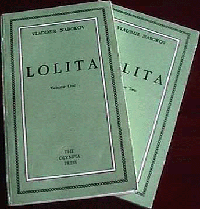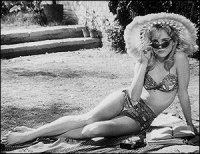And Lolita Turned 50: Celebrating the 50th Anniversary of Vladimir Nabokov's Lolita
by anna battista

"Lolita, light of my life, fire of my loins. My sin, my soul. Lo-lee-ta: the tip of the tongue taking a trip of three steps down the palate to tap, at three, on the teeth. Lo. Lee.Ta." Lolita, Vladimir Nabokov
It's exactly 50 years ago that Lolita by Vladimir Nabokov was published for the first time by the Parisian Olympia Press. The manuscript had caused a scandal even before being published and its author had even tried to burn it, but was dissuaded from doing it by his wife Vera. It was Madame Doussia Ergaz who recommended Nabokov's manuscript to the editor of the Olympia Press, Maurice Girodias. The book - written by a Russian émigré who had become an American citizen and was teaching at Cornell University - had already been rejected by many American publishers. Those were terrible years in the States for what concerns censorship and most of the American editors had explained Nabokov that they would have published his work under his real name, while the author wanted it to be released under a pen name.
Girodias published Lolita in September 1955, in two volumes, with Nabokov's real name on the cover. The response of the audience wasn't that great, at least until Graham Greene noticed it. People became interested and Lolita became more famous as days passed, so famous that the French government noticed it and banned it.
Girodias was not new to receive banning orders from the government or to see the Olympia books being censored. Since, inspired by the work of his father Jack Kahane who had published controversial books before him, Girodias had started Olympia in 1953, he had published Henry Miller's Plexus, the Marquis De Sade's The Bedroom Philosophers, Guillaume Apollinaire's Memoirs of a Young Rakehell, Georges Bataille's A Tale of Satisfied Desire, Beckett's Watt , Molloy, Malone Dies and The Unnamable and a series of erotic novels – among them Helen and Desire, Thongs, Lust, The Enormous Bed, Play My Love, The Loins of Amon, Roman Orgy and The House of Borgia - written by young authors who, for money, turned to write erotica in English to escape French censorship.
When Lolita came out, Olympia's fame had already spread and the news about a publishing house printing DBs, dirty books, had reached the French authorities and La Brigade Mondaine. Books were taken away, or were simply banned, lawsuits started. One day a police inspector of the Vice Squad visited Girodias: he wanted a few reading copies of some books listed in an Olympia catalogue. The inspector explained Girodias that the British government had requested information about the Olympia Press, and that he had to build up a file on the publishing house.

By signing an official decree on 20 th December 1956, the Minister of the Interior banned twenty Olympia Press books, among them there was also Lolita. The truth was that France had banned these books being under pressure from the UK and the whole thing resulted in a series of controversies: "Henry Miller and Frank Harris, banned on the Olympia Press list, were already available in France in French editions. J.P. Donleavy's Ginger Man, also banned, was freely published in England," John d e St Jorre remembers in his volume The Good Ship Venus: the Erotic Voyage of the Olympia Press , "Lolita, now banned in its English edition, was in the process of being translated quite legally into French for France's most venerable publishing house. And since Lolita could be legally brought into the United States once it was smuggled out of France, France was proving itself more pudibund than the Anglo-Saxon countries. Most absurd from a legal point of view was that the ministerial decree against Olympia's books could only invoke a law restricting subversive political publications." To defend himself, Girodias sued the Ministry of the Interior and asked Nabokov to help him in what the author himself mythically came to call "lolitigation". According to the writer, his defence of the book was the book itself, so he never tried to help Girodias in the various trials and cases that involved his novel.
In early 1958, all the Olympia books banned were released, but when General de Gaulle took over, censorship was strengthened, the Minister of the Interior appealed to the tribunal's decision and the English version of Lolita was banned again, while the French version was published by Gallimard. Girodias had another idea: he decided to sue the government for damages, under the pretext that an unjust application of the law had been made, and that the republican principal equality between citizens had been violated. It worked and Girodias was called to the Ministry of the interior, where he was presented with a compromise: the minister was willing to cancel the ban if Girodias agreed to withdraw his request for damages. He agreed and the ban was finally abrogated on 21 st July 1959, signed by the minister himself.
In the States the situation was still critical, though books with a particular artistic value were put under the First Amendment of the Constitution and saved from being considered obscene. Girodias had discovered that one or two copies of Lolita sent from Paris to the States had been confiscated by the Customs, but then released, so he thought that Lolita could have been printed legally in the States as well. But war broke out between Girodias and Nabokov over the copyright of the book, over payments due to the author and over the fact that Girodias had reprinted a new edition of the book with his own introduction.
The American edition of the book was finally published by Putnam in 1958: though it was never prosecuted in the States, many libraries refused to put it into stock. In Britain the book was published by Weidenfeld & Nicolson in 1959, after a war was sedated between the defenders of Lolita and the conservatives. Nigel Nicolson, Weidenfeld partner and a conservative MP, lost his seat in the Parliament for having insisted on publishing the novel. Both Girodias and Nabokov anyway gained enormous amounts of money from the release of the book: Nabokov retired from Cornell University, Girodias opened a personal Disneyland, La Grande Séverine, a three-floor fantasy, comprehensive of two Parisian nightclubs, a Russian cabaret room, a Brazilian club, a jazz club and a theatre. Girodias's income was increased by the publication of other titles as well, among them also J.P.Donleavy's Ginger Man, Mason Hoffenberg and Terry Southern's Candy, published under the pen name of 'Maxwell Kenton', Pauline Réage's (real name Dominique Aury) Story of O and William Burroughs' The Naked Lunch, yet Lolita remained one of the most famous titles he ever published because of the controversies that surrounded it.
Even now at fifty years from its publication Lolita is still condemned or is still the object of new studies and new criticism: recently, it was also stated that Nabokov copied the main theme for his story from a short story entitled "Lolita" by a German journalist, Heinz von Eschwege who wrote it in 1916 under the name Heinz von Lichberg. German scholar Michael Maar has recently analysed the points of contact between the two texts coming to three conclusions: perhaps Nabokov didn't know Lichberg's "Lolita", but, for a mere coincidence, he wrote a novel with a very similar theme; or perhaps Nabokov had read Lichberg's story, but had forgotten about it, at least till some fragments came back to his mind and he expanded them into his novel. The third hypothesis is that Nabokov knew very well Lichberg's story and had tried, while following its outline, to rewrite it, in an attempt to create something new, something better.
Whatever happened, Vladimir Nabokov's Lolita will remain forever a controversial masterpiece and there's something to remember about controversial masterpieces: they always have incredible secrets that they keep on revealing even after 50 years from their first publication and that's perhaps the best thing about them.
Copyright (c) 2005 erasing clouds |
|